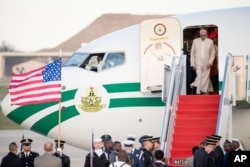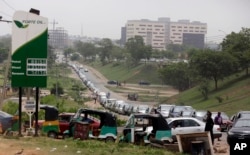Nigeria President Muhammadu Buhari won office over former President Goodluck Jonathan last year, in part, on promises to end the Boko Haram insurgency, which has killed more than 20,000 people and displaced at least 2 million in its seven-year war against the Nigerian state.
Buhari, who marks one year in office on Sunday, has made progress in that area.
Boko Haram has conducted fewer suicide bombings in major cities in Nigeria’s north, and last week one of 219 schoolgirls abducted two years ago by insurgents in Chibok town was found and rescued.
Boko Haram attacks
While the northeastern city of Bauchi has been attacked by Boko Haram several times, retiree Haruna Adamu Tiffi said he feels Buhari has kept his campaign pledge.
“After a few months of his administration, the attacks from the insurgent has come down drastically," Tiffi said.
Buhari, the former military ruler, also was elected on a platform that included curbing corruption and transforming Nigeria’s economy.
A number of high-ranking officials in the Jonathan administration have been arrested on corruption-related charges since Buhari took office, but their cases have dragged on in court.
Tunde Aremu, policy and campaigns manager for anti-poverty charity ActionAid, said the public’s interest in the corruption fight is waning.
“People are paraded on TV, they are taken to court. By and by, people are getting disinterested in the issues. Because when you have a case that appears simple, and it’s not going into full prosecution, people move onto other things," Aremu said.
Global oil prices
The economy is also dragging.
The global fall in the price of oil is partially to blame for the economic woes. So, too, are recent attacks by militants on infrastructure in the oil-producing Niger Delta region.
Petroleum production is thought to have fallen by 500,000 barrels per day due to those attacks.
All indicators show Nigeria is poised to enter a recession. Inflation is at nearly 14 percent. The government recently hiked fuel prices by 67 percent to end a nationwide shortage of gasoline.
Tiger Johnson, a student in the northern city of Kaduna, said the poor are bearing the brunt of the downturn.
"Since we voted Buhari for change, you understand, the poor masses are crying. It’s not the rich people that are suffering. It’s the poor people that are suffering," Johnson said.
Some economists have said Buhari should relax controls on obtaining foreign currency, while also allowing the value of Nigeria’s naira to fall. Such a move would boost growth, they have said.
Buhari has so far resisted those moves because he wants to protect local industries and reduce the amount of foreign goods Nigeria imports.
Economy
Kaduna teacher Danmaigona Clement said the current pain will lead to a more stable economy over time.
“These changes that they expected are not the type of changes they will get. They are changes that are painful," Clement said.
But with prices of food and fuel climbing, Buhari has failed to deliver on what he promised, retiree Suleman Yakubu said.
"Where is the change? Where is the change?” Yakubu asked.
The president is expected to address the nation on Sunday.
VOA's Nigerian reporters Ibrahima Yakubu Kaduna, Ardo Hazzad in Bauchi and Chima Nwankwo in Abuja contributed to this story.






